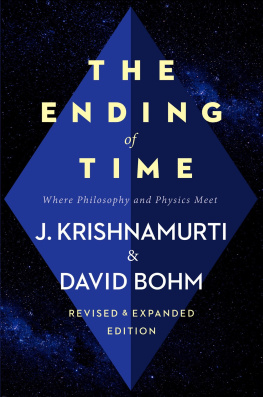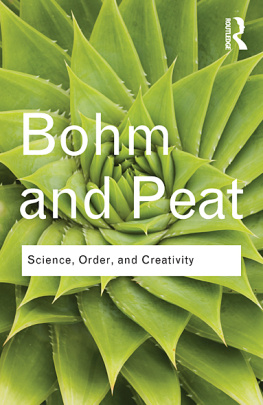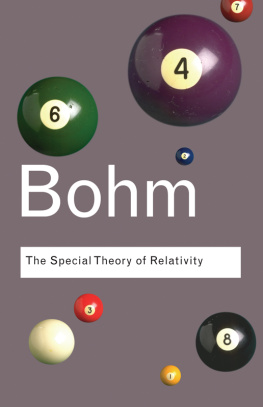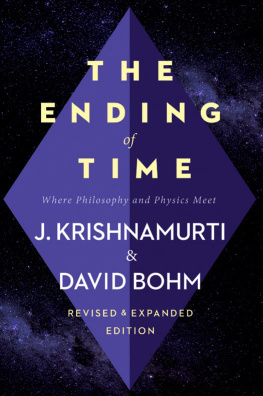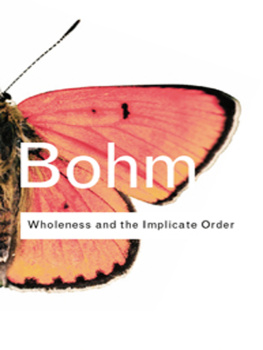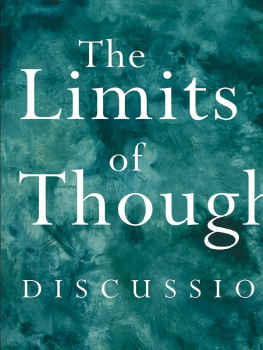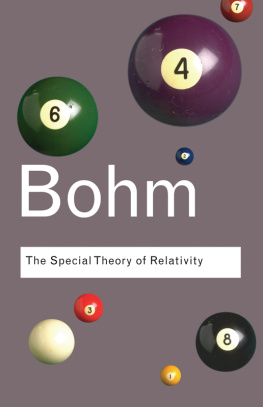Krishnamurti and David Bohm - The Ending of Time
Here you can read online Krishnamurti and David Bohm - The Ending of Time full text of the book (entire story) in english for free. Download pdf and epub, get meaning, cover and reviews about this ebook. publisher: HarperCollins, genre: Religion. Description of the work, (preface) as well as reviews are available. Best literature library LitArk.com created for fans of good reading and offers a wide selection of genres:
Romance novel
Science fiction
Adventure
Detective
Science
History
Home and family
Prose
Art
Politics
Computer
Non-fiction
Religion
Business
Children
Humor
Choose a favorite category and find really read worthwhile books. Enjoy immersion in the world of imagination, feel the emotions of the characters or learn something new for yourself, make an fascinating discovery.
- Book:The Ending of Time
- Author:
- Publisher:HarperCollins
- Genre:
- Rating:5 / 5
- Favourites:Add to favourites
- Your mark:
- 100
- 1
- 2
- 3
- 4
- 5
The Ending of Time: summary, description and annotation
We offer to read an annotation, description, summary or preface (depends on what the author of the book "The Ending of Time" wrote himself). If you haven't found the necessary information about the book — write in the comments, we will try to find it.
The Ending of Time — read online for free the complete book (whole text) full work
Below is the text of the book, divided by pages. System saving the place of the last page read, allows you to conveniently read the book "The Ending of Time" online for free, without having to search again every time where you left off. Put a bookmark, and you can go to the page where you finished reading at any time.
Font size:
Interval:
Bookmark:

T hese dialogues between Jiddu Krishnamurti and the theoretical physicist David Bohm started by addressing the origin of human conflict. Both men agreed in attributing this to the separative and time-bound nature of the self and the way that it conditions us to rely wrongly on thought, which is based on inevitably limited past experience. The possibility of insight that will end this flawed mentality was discussed in depth. The focus then shifted to an inquiry into the significance of death, and to a discussion probing the ground of being and the place of consciousness in the universe. The final dialogues reviewed the profound linkage that Krishnamurti and Bohm saw between these ultimate questions and everyday life, and what we can do about the barriers that stand in the way.
The backgrounds of the two men could hardly be more different. Born in India, Jiddu Krishnamurti was chosen by the Theosophical Society at the age of thirteen to be a vehicle for the World Teacher, a role which he firmly renounced at the age of thirty-four. Without any formal education, he then travelled the world giving talks and interviews until the age of ninety. Rejecting any kind of professional title for himself, and even any kind of formal description of his talks, he spoke to his audiences as a friend and disclaimed any authority, urging listeners to test the truth of his words in their daily lives. Meditation and its insights were for Krishnamurti the way of life.
Born in the United States, David Bohm, one of the outstanding theoretical physicists of the twentieth century, graduated from Pennsylvania State College and obtained at the age of twenty-six his Ph.D. in physics at the University of California, Berkeley, under the direction of Robert Oppenheimer. He then taught at Princeton, working closely with Einstein. Because of blacklisting, at the time of the McCarthy era, for alleged pro-communist sympathies, he was forced to leave the United States and took up a post at the University of So Paulo in Brazil. He completed his career as professor of theoretical physics at Birkbeck College, University of London. He was a prolific author of works on physics and was engaged in path-breaking research until his death.
This book has been prepared from dialogues that took place between Jiddu Krishnamurti and Professor David Bohm in America and in England between April and September 1980. On certain occasions other people were present, and their occasional contributions to the discussions, unless otherwise stated, are attributed to Questioner rather than to individuals by name.
The appendix that forms the second part of the book consists of two conversations in 1983 between Bohm and Krishnamurti on the future of humanity. Although the conversations contain this new and different topic, they have been included in the book because they explore exchanges that develop some crucial points in the Ending of Time dialogues.
DAVID SKITT, 2014
I n March 2013 a striking map appeared on the worlds TV screens of the state of the universe 380,000 years after the Big Bang. Public interest at this infant image flared but quite quickly subsided, perhaps because after decades of human exploration of space, we now take these findings for granted. The Hubble Space Telescope has for years been sending back astonishing, often beautiful portraits of distant galaxies, showing massive convulsions of energy billions of light-years away.
Now that these extraordinary vistas are being revealed to us, it is perhaps not surprising that a number of philosophers and scientists have taken up the ultimate issue of the place of human consciousness in the universe. What we can see and learn from the cosmos clearly raises challenging and daunting questions. Long ago Blaise Pascal, the French scientist and religious writer, found infinite space frightening, and in our time the evolutionary biologist Richard Dawkins assures us that the universe doesnt care about human preferencesan issue that Jiddu Krishnamurti and the physicist David Bohm discussed in The Ending ofTime. The vast spans of time and distance of the universe also seem to make almost footling any deep probing of it by minds on a small third rock from the sun.
The philosopher Thomas Nagel summed up well in his book Mind and Cosmos the modesty called for in dealing with this subject but also the case for ongoing inquiry:
I would like to extend the boundaries of what is not regarded as unthinkable, in light of how little we really understand about the world.... It is perfectly possible that the truth is beyond our reach, in virtue of our intrinsic cognitive limitations, and not merely beyond our grasp in humanitys present stage of intellectual development. But I believe that we cannot know this, and that it makes sense to go on seeking a systematic understanding of how we and other living beings fit into the world.
And the neuroscientist Christof Koch, in his book Consciousness: Confessions of a Romantic Reductionist, boldly argued that
the entire cosmos is suffused with sentience. We are surrounded and immersed in consciousness; it is in the air we breathe, the soil we tread on, the bacteria that colonize our intestines, and the brain that enables us to think.
Both Thomas Nagel and Christof Koch reflected in their views a willingness to expand, each in his own way, the horizons of the human mind, and it was in this fresh climate of innovative inquiry that the Ending of Time dialogues between Jiddu Krishnamurti and David Bohm fell naturally into place. Krishnamurti, for his part, made the psychological case for the illusions of the separative self needing to end before the mind can delve deeply into issues such as the human place in the cosmos. And he and Bohm discussed the cause of these illusions, and particularly the conflict they engender, in detail. But he also went on to argue strongly that rational inquiry can clear the way for profound and transforming insight into this question. Does such deep exploration have implications for our everyday lives? Krishnamurti argued that it does; the human being does not have to be a timorous witness, an awed or baffled outcast in the universe. What the ending of such psychological exile might mean for humanity was explored in depth.
In this new enlarged edition, two more dialogues have been added to the thirteen in the previous book. This complete edition also contains, in an appendix, two later dialogues in a part entitled The Future of Humanity, which David Bohm described in a foreword as both amplifying and possibly serving as an introduction to those in The Ending of Time. The editors felt, however, that the distinction made between brain and mind in the second of these dialogues could most usefully conclude the whole series. Readers are invited to make their own choice.
Study of these fifteen dialogues will also benefit from combining the reading of this book with listening to the audio recordings of them. There are often pauses in these recordings to allow pondering of what is said, at times also touches of humour, and careful and constant probing by both Jiddu Krishnamurti and David Bohm to find the best words for their exchanges. Please see www.jkrishnamurti.org for a selection of audio recordings available for download.
DAVID SKITT
1 APRIL 1980, OJAI, CALIFORNIA
JIDDU KRISHNAMURTI: How shall we start? I would like to ask if humanity has taken a wrong turn.
DAVID BOHM: A wrong turn? Well, it must have done so, a long time ago, I think.
Font size:
Interval:
Bookmark:
Similar books «The Ending of Time»
Look at similar books to The Ending of Time. We have selected literature similar in name and meaning in the hope of providing readers with more options to find new, interesting, not yet read works.
Discussion, reviews of the book The Ending of Time and just readers' own opinions. Leave your comments, write what you think about the work, its meaning or the main characters. Specify what exactly you liked and what you didn't like, and why you think so.

